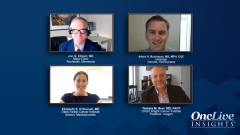
Addressing Health Inequities in Cancer Screening: Challenges and Opportunities
Explore critical issues surrounding health disparities in cancer screening, as discussed by experts, and the urgent need to bridge gaps in access, trust, and follow-up care for underserved populations.
Episodes in this series

Transcript:
Adam H. Buchanan, MS, MPH, CGC: Tell me more about health inequities as they relate to cancer.
Jon O. Ebbert, MD: [It is] critically important to talk about this. There [are] disparities that exist for racial and ethnic minorities, underserved populations. I work in a rural area, and I know there [are] even in my own backyard and [throughout] Rochester, Minnesota, lots of health disparities, a disproportionate share of the burden of certain types of cancers. When we look at Alaska Natives or Native Americans, they have an 80% higher incidence rate of kidney cancer. The Hispanic population has more than double the mortality rate from liver cancer. Stomach and prostate cancers and multiple myeloma are disproportionately affecting Black people. And they have more than 2-fold higher death rates from these cancers. Asian populations have a higher incidence of infectious disease or infectious agent-related cancers, and individuals living in the areas in which I work in rural areas have a 17% higher death rate from all cancers combined.
And some of these special groups have a higher percentage of late-stage diagnoses. For example, localized stage disease was diagnosed in 58% of Black women versus 69% of White women with breast cancer and 37% of Black women versus 46% of White women with cervical cancer. And some of these groups have higher rates of overall cancer mortality, with 19% higher mortality rates among Black males than among White males. Black women have a 12% higher overall cancer death rate than their White counterparts despite having an 8% lower incidence rate. So there are a lot of health disparities that need to be addressed in the current system.
Elizabeth O’Donnell, MD: Perhaps this is a good transition point to switch our focus to Dr Beer. What concerns need to be addressed for cancer screening to bridge gaps related to health equity?
Tom Beer, MD, FACP: Thank you for that question. There are a number of concerns that are worthy of discussion. First of all, a history of systemic racism as well as structural barriers stand in the way of access and utilization of screening. For example, residents living in more remote areas generally have less access to health care services. And that’s not only on the patient side but also on the provider side. Bureau of Health Workforce and Health Resources and Services Administration reports, for example, [show] that a 61.5% [shortage] of primary medical health professionals affects the rural areas of our country.
There is mistrust of the health care system deeply rooted in our history of racism and discrimination in this country. Cultural beliefs vary across groups, as does the level of knowledge about cancer screenings. There’s also evidence that even when screening has access, there [are] inequities with access to follow-up care. Follow-up exams may be delayed. Screening guidelines may not be followed equally across various groups in our country…. Compared with non-Hispanic White individuals, racial and ethnic minorities are among those diagnosed with unscreened cancers at later stages, at stages where interventions are likely to be less effective.
Racial disparities also caused treatment delays even following diagnosis. [For instance,] Black women with breast cancer experience delays in surgery beyond 90 days almost twice as frequently as White women. Black men 55 years and younger with prostate cancer experienced treatment delays beyond 6 months almost twice as frequently as White men of the same age. An analysis of 330 million unique patient journeys found that among patients with colorectal cancer who underwent chemotherapy or surgery, Black patients waited an average of 8 days longer than White patients for treatment following initial colorectal cancer diagnosis. So there is much opportunity to improve in this area.
Transcript is AI generated and edited for readability.

































